Related Research Articles

A musical ensemble, also known as a music group or musical group, is a group of people who perform instrumental or vocal music, with the ensemble typically known by a distinct name. Some music ensembles consist solely of instruments, such as the jazz quartet or the orchestra. Other music ensembles consist solely of singers, such as choirs and doo wop groups. In both popular music and classical music, there are ensembles in which both instrumentalists and singers perform, such as the rock band or the Baroque chamber group for basso continuo and one or more singers. In classical music, trios or quartets either blend the sounds of musical instrument families or group together instruments from the same instrument family, such as string ensembles or wind ensembles. Some ensembles blend the sounds of a variety of instrument families, such as the orchestra, which uses a string section, brass instruments, woodwinds and percussion instruments, or the concert band, which uses brass, woodwinds and percussion.
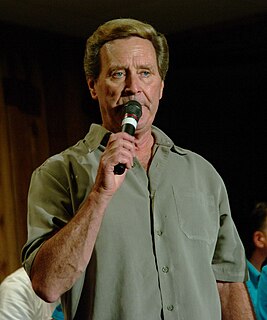
James W. Sturr Jr. is an American polka musician, trumpeter, clarinetist, saxophonist and leader of Jimmy Sturr & His Orchestra. His recordings have won 18 out of the 24 Grammy Awards given for Best Polka Album. Sturr's orchestra is on the Top Ten List of the All-Time Grammy Awards, and has acquired more Grammy nominations than anyone in the history of musical polka awards.

A jazz band is a musical ensemble that plays jazz music. Jazz bands vary in the quantity of its members and the style of jazz that they play but it is common to find a jazz band made up of a rhythm section and a horn section.

A big band is a type of musical ensemble of jazz music that usually consists of ten or more musicians with four sections: saxophones, trumpets, trombones, and a rhythm section. Big bands originated during the early 1910s and dominated jazz in the early 1940s when swing was most popular. The term "big band" is also used to describe a genre of music, although this was not the only style of music played by big bands.

Lindley Armstrong "Spike" Jones was an American musician and bandleader specializing in spoof arrangements of popular songs and classical music. Ballads receiving the Jones treatment were punctuated with gunshots, whistles, cowbells and outlandish and comedic vocals. Jones and his band recorded under the title Spike Jones and His City Slickers from the early 1940s to the mid-1950s, and toured the United States and Canada as The Musical Depreciation Revue.
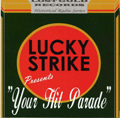
Your Hit Parade is an American radio and television music program that was broadcast from 1935 to 1953 on radio, and seen from 1950 to 1959 on television. It was sponsored by American Tobacco's Lucky Strike cigarettes. During this 24-year run, the show had 19 orchestra leaders and 52 singers or groups. Many listeners and viewers casually referred to the show with the incorrect title The Hit Parade.

World News Now is an American overnight news broadcasting that is broadcast on ABC. Airing during the early morning hours each Monday through Friday, the program features a mix of general news and off-beat stories, along with weather forecasts, sports highlights, feature segments, and repurposed segments and story packages from other ABC News programs; its tone is often lighthearted, irreverent and humorous.

The Lawrence Welk Show was an American televised musical variety show hosted by big band leader Lawrence Welk. The series aired locally in Los Angeles for four years, from 1951 to 1955, then nationally for another 16 years on ABC from 1955 to 1971, followed by 11 years in first-run syndication from 1971 to 1982. Repeat episodes are broadcast in the United States by Public Broadcasting Service (PBS) stations. These airings incorporate an original program—usually, a color broadcast from 1965 to 1982—in its entirety. In place of the commercials, newer performance and interview clips from the original stars and/or a family member of the performers are included; these clips are occasionally updated.
Ozark Jubilee is a 1950s United States network television program that featured country music's top stars of the day. It was produced in Springfield, Missouri. The weekly live stage show premiered on ABC-TV on January 22, 1955, was renamed Country Music Jubilee on July 6, 1957, and was finally named Jubilee USA on August 2, 1958. Originating "from the heart of the Ozarks", the Saturday night variety series helped popularize country music in America's cities and suburbs, drawing more than nine million viewers. The ABC Radio version was heard by millions more starting in August 1954.
Captain Stubby and the Buccaneers was a country-comedy band that performed largely in the Midwest United States from the late 1930s into the 1960s.
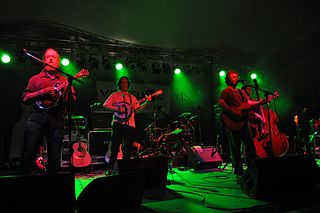
Railroad Earth is a bluegrass-influenced American band formed in Stillwater, New Jersey in 2001. The band's music combines elements of progressive bluegrass, folk, rock, country, jazz, Celtic and other Americana influences. Recognized as "carrying on the tradition of improvisational, genre-spanning music laid forth by the Grateful Dead," Railroad Earth is known for lyrical songwriting and extensive live improvisation. The band takes its name from the Jack Kerouac prose poem "October in the Railroad Earth". The band also has a song of the same name.
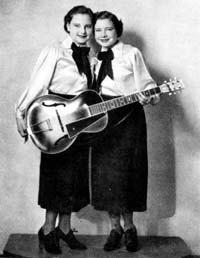
The DeZurik Sisters were two of the first women to become stars on both the National Barn Dance and the Grand Ole Opry, largely a result of their original yodeling style.
Giles, Giles and Fripp were an English rock group, formed in Bournemouth, Dorset in August 1967. It featured brothers Michael Giles on drums and vocals and Peter Giles on bass guitar and vocals, and Robert Fripp on guitar. The band's music showed an eclectic mix of pop, psychedelic rock, folk, jazz, and classical influences. The group eventually evolved into pioneering progressive rock band King Crimson.
It's Polka Time is an American musical television series broadcast by ABC from July 1956 to September 1957.
ABC Barn Dance is an early country and Western music show on American television, a simulcast of the popular radio program National Barn Dance, a title that was also sometimes used for the TV version. It also included some folk music. The show aired on Monday nights from February 21 to November 14, 1949 on ABC-TV. Originally broadcast from 8:30 to 9 p.m. Eastern Time, it was moved to 9 p.m. and then to 9:30 p.m.

Donald Henry Kay AM is an Australian classical composer.
The Tonight Show Band is the house band that plays on the American television variety show The Tonight Show. From 1962 until 1992, when the show was known as The Tonight Show Starring Johnny Carson, the band was a 17-piece big band, and was an important showcase for jazz on American television. During the Carson era, the band was always billed as "The NBC Orchestra" and sometimes "Doc Severinsen and the NBC Orchestra".
The woodwind section, which consists of woodwind instruments, is one of the main sections of an orchestra or concert band. Woodwind sections contain instruments given Hornbostel-Sachs classifications of 421 and 422, but exclude 423
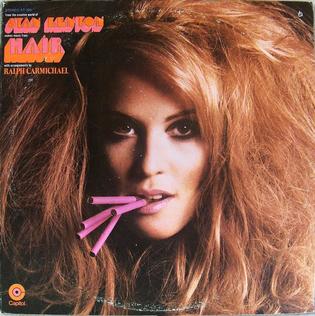
Hair is an album by bandleader Stan Kenton featuring big band versions of tunes from the rock musical Hair recorded in 1969 for Capitol Records.
References
- ↑ McNeil, Alex, Total Television: The Comprehensive Guide to Programming From 1948 to the Present, Fourth Edition, New York: Penguin Books, 1996, ISBN 0 14 02 4916 8, p. 667.
- 1 2 3 4 5 6 7 8 Brooks, Tim, and Earle Marsh, The Complete Directory to Prime-Time Network and Cable TV Shows, 1946-Present (Sixth Edition), New York: Ballantine Books, 1995, ISBN 0-345-39736-3, p. 830.